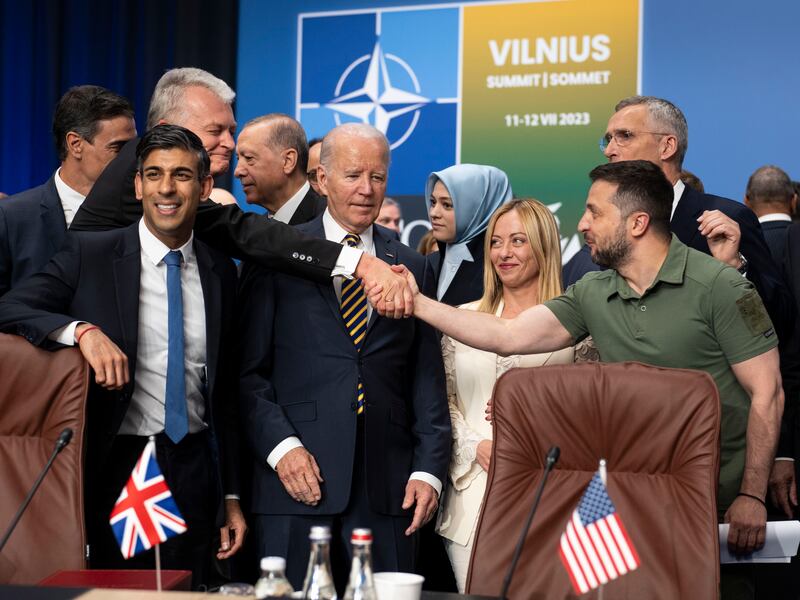On Sept. 30, 1938, British Prime Minister Neville Chamberlain left the negotiating table at a conference in Munich, Germany. He had spent the past few months negotiating with German Chancellor Adolf Hitler and Italian dictator Benito Mussolini on a nonaggression agreement that allowed Germany to complete its conquest of disputed territories in the Sudetenland and to invade Czechoslovakia without objection from Britain and France. In return, Hitler agreed to no further aggression on the European continent and Britain would be spared from any further conflict.
Chamberlain was proud that he kept his country out of war. In an impromptu speech outside 10 Downing Street in London, Chamberlain raised the signed treaty above his head and declared that he was “bringing peace with honor. I believe it is peace for our time”.
Upon hearing the statement, Winston Churchill, who in two years would replace Chamberlain as Britain’s wartime leader, snarked, “You were given the choice between war and dishonor. You chose dishonor, and you shall have war.”
Nearly a year later, Hitler expanded his grip into Czechoslovakia and invaded Poland. World War II had begun.
“War is hell,” William Tecumseh Sherman once bluntly stated. But as the University of Chicago social scientist Chris Blattman shows in his excellent book “Why We Fight,” war is rare and costly. In most cases, countries and parties avoid conflict because the cost to both sides is sufficiently high that bargaining and dealmaking is preferable to violence and calamity. What is the point of occupying a territory that is broken beyond repair?
Economics and game theory (the study of strategy and competitive interaction) teach us that the best type of national security policy is deterrence. Credible signals of strength and commitment will force a belligerent actor to rethink a possible invasion or to settle quickly if combat operations have begun. Credibility must be costly to the signaler, however. If I perceive that my opponent will not follow through on his threats, then I can disregard the warnings as pure noise and push forward with my intentions.
As the leader of the free world, it must be the policy of the United States government to state clearly, without equivocation, our intentions and signal extreme seriousness about what we would be willing to sacrifice, even at a high cost, to maintain our interests abroad. The ancient Romans understood this principle. Any citizen traveling abroad could receive free passage by uttering the phrase civus Romanus sum: I am a Roman citizen. It was a clear, credible, deterrent signal in the ancient Mediterranean.
The North Atlantic Treaty Organization, or NATO, clearly exemplifies these ideals. Western European allies and the United States founded NATO on the desire to send a credible signal to their former ally, the USSR, that aggression from the East would not be tolerated as it was before World War II. The keystone of NATO is Article 5, which states that an attack on one would be considered an attack on all. This signal is so strong that NATO has only invoked Article 5 once: after the 9/11 terrorist attacks in 2001.

Blattman points out in his book that conflicts will not resolve themselves if the gains are indivisible. It is impossible to divide Ukrainian sovereignty or Putin’s ego and grip on power, which are the two gains in this conflict. Thus, there will be no easy end to this conflict.
Putin is willing to play the long game. The question is whether the United States is willing to check him.
Aid to Ukraine is also a good “deal” since most of the aid is in the form of Cold War munitions that we need to destroy, anyway. The appropriations allow us to refill our own arsenal with modern equipment after we transfer old equipment we don’t need anymore: a modern-day Lend-Lease Act. Essentially, we are spending around 10% of the defense budget (with no American troops) in order to check Putin’s aggression.
Ukraine is not a NATO signatory, so Article 5 does not apply. However, what is at stake is the credibility of American resolve. I believe refusal to back our ally would be a severe mistake in this proxy conflict where not only Russia, but Iran, China, North Korea and, recently, Venezuela are watching to see if the United States and the European Union are serious about preserving democracy and sovereignty.
Sadly, many elected leaders are willing to put our own country’s security at risk for short-term political returns. To be sure, leaders should ask tough questions and ensure accountability of aid. But when they chip away at our resolve to stand with NATO and back Ukraine in order to please extreme voices and gain social media prominence, they mute that “credible signal” and diminish our security, risking even more costly violence.
At the signing of the Declaration of Independence, Benjamin Franklin, perhaps apocryphally, quipped, “We will either hang together or hang separately.” A game theorist would have appreciated that sentiment and so must those who are serious about America’s security.
Michael Kofoed is an assistant professor of economics at the University of Tennessee at Knoxville and a research fellow at the Institute of Labor Economics.

